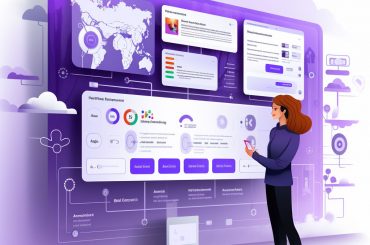Table of Contents
What is Digital Process Automation System?
Several process automation and agile development software technologies are included in the burgeoning market for tools called digital process automation software. These resources assist businesses in creating the fully automated, comprehensive case and process solutions. Digital Process Automation DPA platforms offer the resources required to create apps, launch integrations, and oversee the procedures involved in almost any digital workflow.
Software for business process management and low-code development share a common technological foundation. The function of the community developer is a critical feature that sets Digital Process Automation apart from other agile development technologies. Although designers and developers can customize functionality and appearance, users can frequently, but not always, build processes and basic business applications utilizing Digital Process Automation platforms. However, Digital Process Automation technologies are more frequently employed as a tool for digital transformation than as a change processes solution.
By fusing operational information and process automation, digital process automation tools offer integrated cross-channel engagements for both internally and externally objectives, increasing productivity throughout the board. To improve orchestration and standardize the user experience, case management and intelligent automation technologies are merged.
To qualify and get included in the Digital Process Automation system category, a product must:
- Automate Processes Using Robotics And Digital Technologies
- Enhance End-To-End Case Management Capabilities
- Add A Measure Of Clever Automation
- Possess The Ability To Create Workflows And Applications With Low-Code.
What Can Digital Process Automation System Do For You?
We’d all like to have more time and money. Businesses are no different, and digital process automation platform has several, quantifiable benefits. The following are some factors that prompt companies to use Process Directors:
-
Engine For Integrated Business Rules:
The business rules engine in Process Director leverages cutting-edge machine learning algorithms to give users the ability to quickly design improved workflow and more intricate business processes.
-
No Involvement In Programing
A GUI workflow builder for business users that is entirely web-based and doesn’t involve programming.
-
Online Smart Forms
A quicker, simpler, and more affordable method of developing an automated electronic forms system.
-
Intelligence About Processes And Reporting
A wide range of searching, reporting, business activity management (BAM), and process intelligence (BI) tools are available in Process Director business process management software.
The Core Components of Digital Process Automation DPA
Before we delve deeper, let’s establish the foundational blocks of Digital Process Automation:
Technology Stack: The Backbone of Digital Process Automation DPA
At the core of Digital Process Automation DPA lies a robust technology stack. This consists of software and hardware infrastructure that supports the automation of tasks. The technology stack is typically composed of platforms that offer workflow management, business rule engines, and data integration capabilities.
Integration Capabilities: Seamlessly Connecting Systems
Digital Process Automation systems must be able to interact with a multitude of on-premises and cloud-based systems. Integration capabilities ensure that data can flow freely and processes are interconnected, enabling end-to-end automation.
Why Digital Process Automation Is Essential in the Digital Era
In a highly competitive landscape, organizations are increasingly turning to Digital Process Automation to stay ahead. Let’s unpack why Digital Process Automation is considered an essential strategy in the digital transformation arsenal.
Driving Efficiencies and Productivity
Automation of processes leads to significant time and resource savings, thereby boosting operational efficiency. Tasks that once took hours or days to complete can now be executed in a fraction of the time.
Reducing Errors and Enhancing Compliance
Human error is an inevitable part of any manual process. By digitizing and automating workflows, Digital Process Automation reduces the risk of mistakes, leading to more accurate outcomes. Furthermore, Digital Process Automation can implement regulatory and compliance rules across various processes consistently, ensuring that organizations meet their legal obligations.
Fostering Agility and Adaptability
The digital nature of Digital Process Automation allows for agile responses to changing business environments and customer demands. New processes can be designed and deployed quickly, enabling organizations to adapt and innovate with agility.
The Transformative Power of Digital Process Automation: Examples Across Industries
Let’s bring Digital Process Automation to life with industry-specific examples. These diverse sectors showcase the versatility of Digital Process Automation in driving operational excellence.
Banking on Efficiency: Loan Application Processing
In the banking sector, loan application processing often involves a plethora of manual checks, which can be slow and error-prone. Digital Process Automation can automate the collection and validation of customer data, route applications for review, and execute the decision process based on predefined business rules, drastically reducing the time it takes to process a loan application.
Supply Chain Superhighway: Smart Inventory Management
The supply chain industry is highly complex, with multiple nodes and stakeholders. Digital Process Automation allows for a sophisticated inventory management system that can monitor stock levels in real-time, automatically place orders with suppliers, and update inventory records across the organization the moment a change occurs.
Healthcare Harmonization: Patient Records and Billing
Healthcare organizations can benefit from Digital Process Automation by automating the creation and management of patient records, simplifying billing processes, and ensuring that sensitive medical data is securely handled in compliance with regulations.
The Best Digital Process Automation Solution 2024
Based on each digital process automation vendors Authority Score, a meta-analysis of user feedback from the most reliable websites for business software reviews, and our own five-point inclusion criteria, the Folio3 team has chosen the top digital process automation firms.
Businesses of all sizes, regardless of industry, can profit from the digital process automation solution. The digital process automation tool enhances activities throughout applications and departments by utilizing relatively low-code development functionalities to automate business activities. A digital process automation system adds tools for automating operations that often require human involvement to a Business Process Management (BPM) platform, expanding its functionality.
However, choosing the best digital process automation solutions can be a complicated process, as it requires in-depth research and often comes down to more than just the solution and its technical capabilities. To make your search a little easier, our editors have profiled some of the best digital process automation solutions in one place. The editors have listed the companies in alphabetical order.
Here is a comprehensive view of the best digital process automation systems for your consideration;
-
Axon Ivy
The solution from Axon Ivy combines the power to create enterprise-grade apps with the athleticism of a prototype-driven low-code development platform. The Axon Ivy system provides a forthcoming architecture whereby interoperable technologies may simply enhance and is highly scalable. Professional workflow management, user-friendly modelling tools, an open architecture, quick commissioning, a number of system connectors, low-code support, and other features are only a few of its enterprise-wide digital process automation system.
-
Bizagi
Bizagi is a pioneer in software for automating digital business processes. The company’s main offering is an iBPMS that supports Java Platform Enterprise Edition and.NET Platform execution. Bizagi Engine, Bizagi Studio, and Bizagi Modeler are among the three tiers of solutions that the provider additionally provides. Businesses can collaborate including an adaptive orchestration layer that links existing systems, people, apps, information, and devices throughout an organization by using Bizagi’s low-code digital process automation platform.
-
BP Logix
Process Director from BP Logix is a full BPM system with capabilities for business process automation, case management, and workflow software. These characteristics make it possible for both IT and business customers to build solid workflow and business process management solutions to handle different business challenges. Businesses can make use of a variety of digital process automation system capabilities from BP Logix’s Process Director solution, including a built-in business requirements engine, process intelligence (BI), web-based GUI process creation tools, and business activity management (BAM), and more.
-
FlowForma
No-code workflow automation tools from FlowForma provide business professionals with low entry barriers and quick process development. Business users and Heads of departments can easily adopt HR onboarding procedures, new product development, and clinical trials to boost organizational efficiency and productivity thanks to the award-winning Microsoft Office 365® software FlowForma® Process Automation.
-
IBM
The IBM Cloud Pak for Business Automation solution gives businesses access to an integrated, modular software suite that was created for hybrid cloud settings, automates operations, and boosts growth. End-to-end automation could be used for a variety of tasks, including workflow analysis, low-code AI application development, performance data tracking, task delegation to bots, process monitoring, inefficiency detection, and more. HR onboarding, client assistance, payable accounts, and remote office dispatch are typical use scenarios for IBM Cloud Pak.
-
Newgen Software
With a presence in more than 60 countries, Newgen Software Technologies is a leading global supplier of business process management (BPM), enterprise content management (ECM), and customer communication management (CCM) solutions. Companies can use a low-code process automation platform to automate complicated, content-driven, and consumer-engaging business processes with Newgen’s iBPS solution package. Intelligent process automation, agile development resources, fluid case management, workflow analytics, original reporting, and other features are among the functionalities.
-
Nintex
Nintex provides IPA solutions that eliminate organizational inefficiencies and swap them out for smooth, sophisticated procedures. Users can connect with all content repositories, databases of history, and people using the simple, no-code platform known as Nintex Workflow Cloud®. Robotic process automation (RPA) bots, automated business management, automated corporate forms, mobile management, and other features are all included in the platform’s process automation capabilities. The following sectors are served by Nintex’s reliable IPA solutions: Energy, Finance And insurance, Government, Healthcare and Life Sciences, among others.
-
Pega
The business process management solution is available from Pega and was built using Java and OOP principles. Utilizing visual tools, the platform enables users to swiftly put together an executable business application. Pega has a long history of creating software programs that provide assistance with carrying out daily selling, marketing, and service operations. RPA, workflow automation, minimal app development, case management, as well as other capabilities for enhancing dependability and efficiency are all included in the company’s low-code platform.
-
WorkflowGen
For businesses of all sizes, WorkflowGen, a Canadian startup, provides business process management solutions. Both on-premises and cloud deployment options are available for the program. The solution offers a form designer so users may create unique online forms. The form builder eliminates the necessity of additional extensions or plug-ins by utilizing HTML and Java. Let’s say your company wants to go mobile. In such a situation, WorkflowGen provides mobile apps for both iOS and Android, as well as direct support for a modest price via an online forum.





